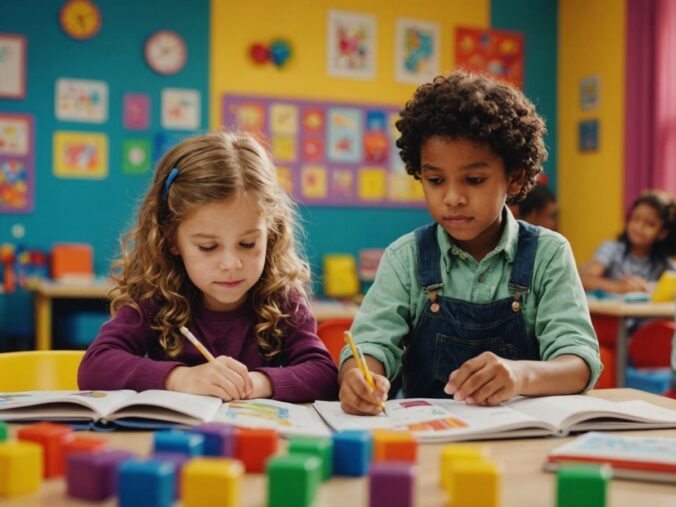Early childhood education is more than just a stepping stone for young children. It lays the foundation for their emotional, social, and cognitive development. By enrolling children in quality early education programs, parents can give their kids a head start in life, setting them up for future success.
Key Takeaways
- Early childhood education helps build confidence and self-esteem in children.
- Kids develop essential social skills through early education programs.
- Early education boosts cognitive abilities like problem-solving and language development.
- Children who attend early education programs are better prepared for school.
- Quality early childhood education can lead to long-term benefits like higher graduation rates and better career opportunities.
The Emotional and Social Benefits of Early Child Education
Early childhood education plays a vital role in shaping a child’s emotional and social development. High-quality early education helps children build a strong foundation for their future interactions and emotional well-being.
Cognitive Advantages of Early Child Education
Enhancing Problem-Solving Skills
Early childhood education programs are designed to help children develop their problem-solving skills. By engaging in activities that require reasoning and critical thinking, children learn to approach challenges with confidence. These skills are essential for their future academic success.
Boosting Language Development
Language development is a crucial part of early childhood education. Through interactive storytelling, songs, and conversations, children expand their vocabulary and improve their communication skills. This early exposure to language helps them become better readers and writers as they grow.
Fostering Creativity and Imagination
Creativity and imagination are nurtured in early childhood education settings. Children are encouraged to explore their ideas through art, play, and imaginative activities. This not only makes learning fun but also helps them think outside the box and develop innovative solutions to problems.
Early childhood education provides a stimulating environment that supports cognitive growth and prepares children for future learning challenges.
How Early Child Education Prepares Kids for School
Improving Academic Readiness
Early childhood education programs act as a bridge between home life and the structured world of elementary school. These programs help children develop the social, emotional, and cognitive skills they need to succeed in primary school and beyond. By providing environments that mirror the classroom, children become more adaptable and ready for future academic challenges.
Establishing Learning Routines
In early childhood education settings, children learn to follow routines and schedules, which is crucial for their future school life. These routines help children understand the importance of time management and organization. They also learn to follow instructions and complete tasks, which are essential skills for academic success.
Encouraging a Love for Learning
Early childhood education fosters a love for learning by making education fun and engaging. Activities are designed to be both educational and enjoyable, sparking curiosity and a desire to learn more. This positive attitude towards learning can last a lifetime, encouraging children to be lifelong learners.
Healthy development continues to support learning throughout childhood and later life.
By focusing on these areas, early childhood education ensures that children are not only ready for school but are also set up for long-term success.
Long-Term Impacts of Early Child Education
Higher Graduation Rates
Children who attend early childhood education programs are more likely to graduate from high school. Studies show that these kids often perform better academically throughout their school years. This strong start helps them stay on track and finish their education.
Better Career Opportunities
Early education doesn’t just help in school; it also sets the stage for future success. Kids who get a good start are more likely to seek higher education and pursue rewarding careers. This can lead to improved socio-economic outcomes in adulthood.
Reduced Need for Special Education Services
High-quality early childhood education can also reduce the need for special education services later on. By addressing learning and developmental needs early, children are better prepared for the challenges of school. This early support can make a big difference in their long-term academic journey.
Investing in early childhood education is not just about helping individual children. It’s about building a brighter future for our communities. When kids get a strong start, they grow up to be well-rounded individuals who positively contribute to society.
The Role of Early Child Education in Family Support

Early childhood education also provides a crucial support system for families that offers guidance in nurturing their child’s development. Effective parenting strategies are often shared through these programs, helping parents understand their child’s needs better.
Providing Parenting Resources
Early childhood education centers often offer resources that help parents with parenting strategies. These resources can include workshops, reading materials, and one-on-one consultations with child development experts. Parents can learn about best practices for child rearing, enhancing parent-child relationships, and understanding child development.
Creating a Supportive Community
These programs also create a supportive community for families. Parents can connect with others who are going through similar experiences, share advice, and offer emotional support. This sense of community can be invaluable, especially for new parents who might feel overwhelmed.
Offering Guidance on Child Development
Early childhood education programs provide guidance on various aspects of child development, including physical, cognitive, emotional, social, and speech/language development. This guidance helps parents set realistic parenting goals and understand the milestones their children should be reaching.
By participating in early childhood education programs, parents can gain the knowledge and support they need to foster a nurturing environment for their children.
Choosing the Right Early Child Education Program
Selecting the best early childhood education program for your child can feel overwhelming, but it doesn’t have to be. Knowing what to look for can make the process smoother and more enjoyable.
Early Child Education and Community Benefits

Building Stronger Communities
Early childhood education (ECE) doesn’t just help kids; it helps the whole community. When children get a good start, they grow up to be better citizens. They are more likely to help others and be involved in their neighborhoods. This makes the community a better place for everyone.
Reducing Societal Costs
Investing in ECE can save money in the long run. Kids who attend quality programs are less likely to need special education or get into trouble with the law. This means fewer costs for schools and the justice system. It’s a smart way to spend money now to save more later.
Promoting Social Equity
ECE helps level the playing field for all kids, no matter where they come from. By giving every child a strong start, we can reduce gaps in education and income. This leads to a fairer society where everyone has a chance to succeed.
By providing children with a strong foundation during their formative years, we are investing in a brighter future for our communities and cultivating well-rounded individuals who will positively contribute to society.
Early childhood education is more than just a stepping stone for kids; it benefits the entire community. When children receive quality early education, they are more likely to succeed in school and life, which in turn creates a stronger, more vibrant community. Want to learn more about how early education can make a difference? Visit our website for more information.
Conclusion
Early childhood education is more than just a stepping stone for academic success; it’s a nurturing environment where young minds flourish. By enrolling your child in a quality program, you’re not only setting them up for better school performance but also fostering essential social skills and emotional well-being. These early years are crucial, and the benefits extend far beyond the classroom, impacting their future and the community. So, take this opportunity to invest in your child’s bright future and watch them grow into well-rounded individuals.
Frequently Asked Questions
Why is early childhood education important for children?
Early childhood education is crucial because it helps in the emotional, cognitive, and social development of a child. It prepares kids for school, improves academic performance, and reduces the need for special education services.
What are the long-term benefits of early childhood education?
Children who attend quality early childhood education programs are more likely to graduate high school, have better career opportunities, and exhibit improved social behaviors.
How does early childhood education support families?
These programs offer guidance on child development, provide parenting resources, and create a supportive community for families.
What should parents look for in an early childhood education program?
Parents should look for quality indicators like trained staff, a safe environment, and a curriculum that promotes emotional, cognitive, and social development.
How does early childhood education benefit the community?
Early childhood education helps build stronger communities, reduces societal costs, and promotes social equity by providing a strong foundation for all children.
What are the cognitive benefits of early childhood education?
Early childhood education enhances problem-solving skills, boosts language development, and fosters creativity and imagination in children.


Leave a Reply